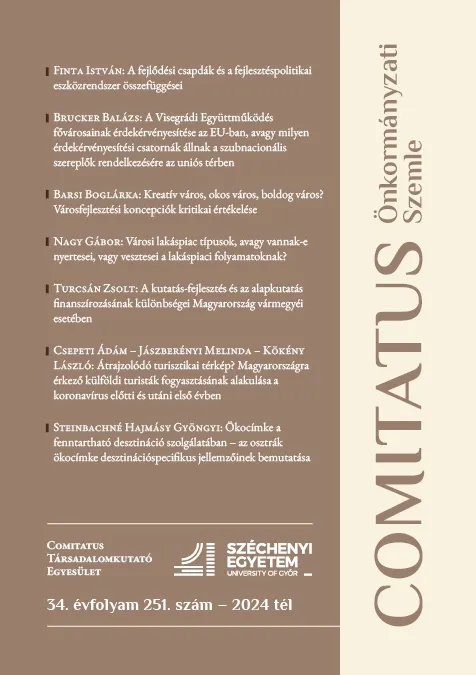A Nyugat-Balkán policentrikus városhálózatának értelmezése európai kontextusban
Interpretation of polycentric urban network of the Western Balkans in a European context
| LETÖLTÉS | DOI: 10.59809/Comitatus.2023.33-246.203 |
|
Szerző: RÁCZ SZILÁRD, osztályvezető, tudományos főmunkatárs, KRTK Regionális Kutatások Intézete, 7621 Pécs, Papnövelde u. 22., szracz##kukac##rkk.hu, ORCID: 0000-0002-9397-2620 |
Author: SZILÁRD RÁCZ, head of department, senior research fellow, Centre for Economic and Regional Studies Institute for Regional Studies, szracz##kukac##rkk.hu, ORCID: 0000-0002-9397-2620 |
|
Kulcsszavak: policentrikus városfejlődés | urbanizáció | Délkelet-Európa | Nyugat-Balkán JEL kód: N94, P25, R12 |
Keywords: policentric urban development | urbanization | Southeast Europe | Western-Balkans JEL code: N94, P25, R12 |
Absztrakt: A tanulmány a policentrikusságot egy sajátos európai makrorégió, a Nyugat-Balkán kontextusában vizsgálja. Faragó László kapcsolódó munkássága gazdag hivatkozási alapot nyújt e téma áttekintésére. A policentrizmus mint eszmerendszer áttekintését követően a Nyugat-Balkán térszerkezeti és városhálózati adottságai kerülnek bemutatásra. Összegzésképpen a tanulmány a policentrizmus lehetőségeit vázolja fel a Nyugat-Balkán térszerkezetében.
Abstract: The study examines polycentrism in the context of a specific European macro-region, the Western Balkans. The related work of László Faragó provides a rich reference for an overview of this topic. Following an overview of polycentrism as a system of ideas, the spatial structural and urban network characteristics of the Western Balkans are presented. In teh conclusion, the paper outlines the potential of polycentrism in the spatial structure of the Western Balkans.
IRODALOMJEGYZÉK
Bachtler, John – Yuill, Douglas: Policies and Strategies for Regional Development: A Shift in Paradigm?, Strathclyde (Regional and Industrial Policy Research Paper, 46), 2001, 41.
Dimou, Michel – Schaffar, Alexandra: Urban hierarchies and city growth in the Balkans, Urban Studies, 2009/13, 2891–2906. https://doi.org/10.1177/0042098009344993
Egyed Ildikó – Zsibók Zsuzsanna: A kohéziós politika irányváltásai a hét szűk és hét bő esztendőben, Comitatus: Önkormányzati Szemle, 2023/3, 119–128. https://doi.org/10.59809/Comitatus.2023.33-246.119
Erdősi Ferenc: A Balkán közlekedésének főbb földrajzi jellemzői, Pécs (Balkán Füzetek, 3), 2005, 130.
ESDP: European Spatial Development Perspective: Towards Balanced and Sustainable Development of the Territory of the EU, Luxembourg, 1999, 87. Elérhető: https://territorialagenda.eu/wp-content/uploads/ESDP.pdf
Estia: European space and territorial integration alternatives: spatial development strategies and policy integration for South-East Europe, Thessaloniki, 2000. (INTERREG IIC CADSES)
Estia-Spose: European Space – Territorial Indicators and Actions for a Spatial Planning Observatory Platform in South-Eastern Europe, Athens, 2006. (INTERREG IIIB CADSES)
Faludi, Andreas – Waterhout, Bas: The Making of the European Spatial Development Perspective: No Masterplan, London (RTPI Library Series), 2002, 224. Elérhető: https://doi.org/10.4324/9780203378878
Faludi, Andreas: From European spatial development to territorial cohesion policy, Regional Studies, 2006/6, 667–678. https://doi.org/10.1080/00343400600868937
Faludi, Andreas: Territorial cohesion: an unidentified political objective: introduction to the special issue, Town Planning Review, 2005a/1, 1–13. https://doi.org/10.3828/tpr.76.1.1
Faludi, Andreas: Polycentric territorial cohesion policy, Town Planning Review, 2005b/1, 107–118. https://doi.org/10.3828/tpr.76.1.9
Faragó László – Hajdú Zoltán – Rácz Szilárd: Államosodás – városhálózat – térszerkezet, Magyar Tudomány, 2012/4, 389–406.
Faragó László – Rácz Szilárd: Városhálózat, in: Horváth Gyula – Hajdú Zoltán (szerk.): Regionális átalakulási folyamatok a Nyugat-Balkán országaiban, Pécs (Régiók Európája, 4), 2010, 241–272.
Faragó László: A jövőalkotás társadalomtechnikája: a közösségi tervezés elmélete, Budapest–Pécs, 2005, 240.
Faragó László: A városokra alapozott területpolitika koncepcionális megalapozása, Tér és Társadalom, 2006/2, 83–102. https://doi.org/10.17649/TET.20.2.1055
Faragó László: Regionalizmus és policentrizmus, teendők Magyarországon, Habilitációs előadás tézisei, Győr, SZE RGDI, 2009, 24.
Faragó László: Térstruktúra: térideák és megvalósításuk a településhálózat-fejlesztésben, Tér és Társadalom, 2007/4, 21–38. https://doi.org/10.17649/TET.21.4.1137
GaWC: Globalization and World Cities Research Network: The World According to GaWC, 2020. Elérhető: https://www.lboro.ac.uk/microsites/geography/gawc/world2020t.html (Letöltés ideje: 2023.08.31.)
Hajdú Zoltán – Illés Iván – Raffay Zoltán (szerk.): Délkelet-Európa: államhatárok, határon átnyúló kapcsolatok, térstruktúrák, Pécs, 2007, 161.
Illés Iván: Közép- és Délkelet-Európa az ezredfordulón, Átalakulás, integráció, régiók, Budapest–Pécs, 2002, 362.
Meijers, Evert – Romein, Arie: Realizing potential: building regional organizing capacity in polycentric urban regions, European Urban and Regional Studies, 2003/2, 173–186. https://doi.org/10.1177/0969776403010002
Rácz Szilárd: A posztszocialista Délkelet-Európa térszerkezeti és városhálózati folyamatai, PhD-disszertáció, Pécs, PTE Regionális Politika és Gazdaságtan Doktori Iskola, 2017, 185.
Rácz, Szilárd – Faragó, László: Habitat (urban development), in: Gál, Zoltán – Lux, Gábor – Illés, Iván (eds.): Danube Region. Analysis and Long-Term Development Trends of the Macro-Region, Pécs (Discussion Papers, 90), 2013, 29–34.
Taylor, Peter J.: Measuring the World City Network: New Results and Developments, in: Firmino, Rodrigo Jose – Duarte, Fabio – Ultramari, Clovis (eds.): ICTs for Mobile and Ubiquitous Urban Infrastructures: Surveillance, Locative Media and Global Networks, Hershey, 2011, 15–23. https://doi.org/10.4018/978-1-60960-051-8.ch002
Waterhout, Bas: Polycentric development: what is behind it?, in: Faludi, A. (ed.): European Spatial Planning, Cambridge, MA, 2002, 83–103.


